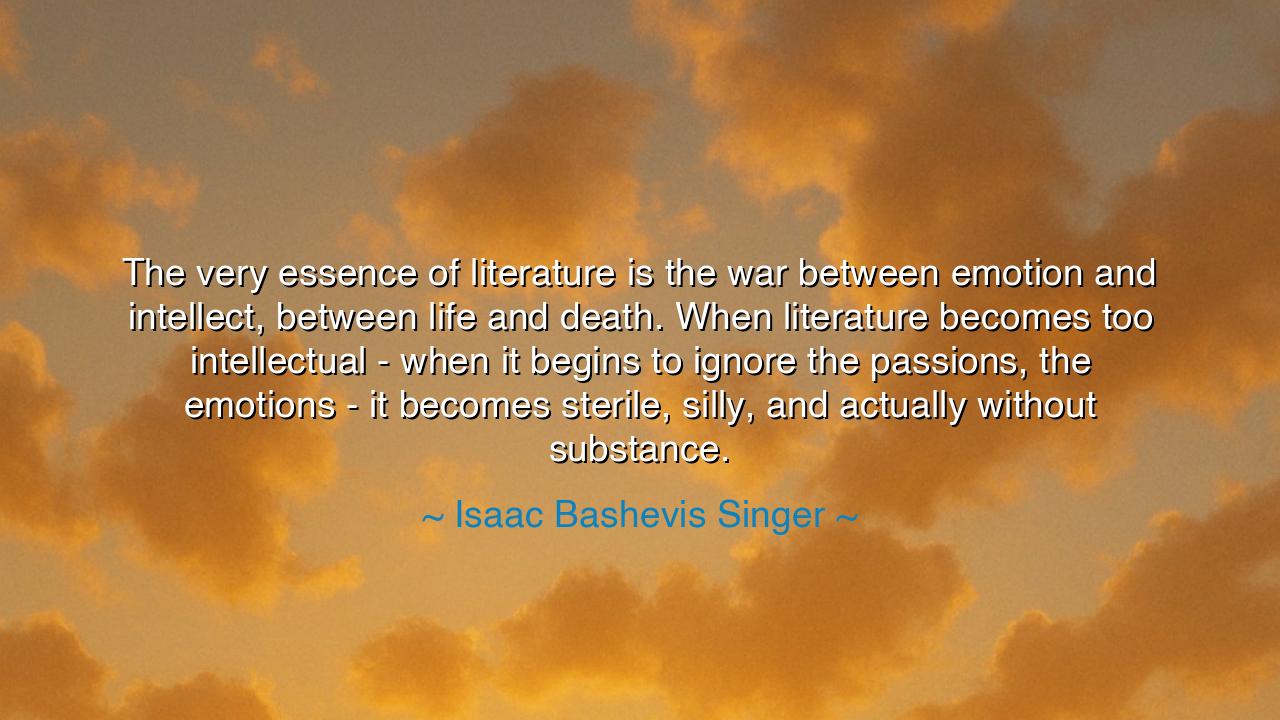
The very essence of literature is the war between emotion and
The very essence of literature is the war between emotion and intellect, between life and death. When literature becomes too intellectual - when it begins to ignore the passions, the emotions - it becomes sterile, silly, and actually without substance.






“The very essence of literature is the war between emotion and intellect, between life and death. When literature becomes too intellectual — when it begins to ignore the passions, the emotions — it becomes sterile, silly, and actually without substance.” — so declared Isaac Bashevis Singer, the storyteller of souls, whose tales bridged the sacred and the profane, the human and the divine. In these words, he does not speak only of literature, but of the beating heart of all creation. For in the written word, as in life itself, there is a ceaseless struggle — between reason and feeling, between the cold clarity of thought and the burning fire of the spirit. When either dominates fully, the balance of truth is lost, and the living word becomes but an empty echo.
Singer, born amid the faith and folklore of Eastern Europe, understood that literature is a mirror of the human condition. To him, every story worth telling arises from this tension — the intellect that seeks meaning, and the emotion that demands to be felt. The intellect asks, “Why?” The heart cries, “Because!” Between these two voices, the writer forges the song of humanity. It is in this very conflict that art breathes — the clash of life and death, of joy and sorrow, of love and despair. To remove passion from this struggle is to drain the blood from the veins of creation. For a story without emotion is not a living thing — it is a corpse dressed in clever words.
In his lifetime, Singer watched the rise of a modern world that worshipped intellect — where literature was dissected, analyzed, and sterilized in the cold chambers of academic thought. But he, a teller of Yiddish tales, wrote for the heart, not the classroom. He knew that the soul of a story is not found in its structure or theory, but in its trembling humanity — in laughter, tears, longing, and redemption. He said, in essence, that to write without emotion is to deny the very life one seeks to capture. For words that do not bleed cannot heal, and thoughts that do not burn cannot enlighten.
Consider the example of Fyodor Dostoevsky, whose works bear the same war between mind and spirit. His intellect wrestled with philosophy, but his pen dripped with the passion of human suffering. In Crime and Punishment, he explored the logic of murder — yet the reader feels not the precision of intellect, but the storm of guilt and mercy, the anguish of a soul at war with itself. Had he written with intellect alone, his pages would be dust; but because he wrote with blood, they became eternal. Thus, Singer reminds us that true literature — and indeed, true living — demands both reason and passion, thought and heart entwined like lovers who cannot live apart.
This war between intellect and emotion is not to be resolved, for it is the very source of creative power. The artist stands between them, translating the ineffable into form, the invisible into voice. Too much intellect, and the art grows lifeless — a statue of perfect symmetry but without pulse. Too much emotion, and it collapses into chaos — a flood without banks, drowning sense in sentiment. The master, therefore, is not the one who ends the war, but the one who harnesses it, who lets the two forces battle within him until from their collision bursts the spark of truth.
Singer’s warning reaches beyond the writer’s desk; it touches the core of human existence. When a person lives only by intellect — calculating, analyzing, and never feeling — their life becomes sterile, “silly,” and without substance. And when one lives only by emotion, without thought or wisdom, they are consumed by impulse and lost in confusion. To be whole, one must honor both — the mind as compass, the heart as flame. Life and death, thought and passion, must forever dance together if we are to remain fully alive.
So, dear listener, take this teaching not only as a guide for writing, but for living. Let your mind be sharp, but let it serve the heart. Let your words, whether spoken or written, carry the weight of feeling as well as the clarity of truth. Do not fear emotion — it is the proof that you are alive. And do not scorn intellect — it is the light that prevents your passion from consuming you. Seek always the middle path, where wisdom burns and feeling thinks.
For as Singer teaches, the essence of literature — and of life — is this sacred tension. When the heart and the mind meet, when the living and the eternal collide, then the word becomes flesh, and art becomes life. Therefore, let every act of creation be both a cry and a contemplation, both fire and form. Only then will your words, and your days, possess substance — and in their harmony of emotion and intellect, you will find not sterility, but immortality.






AAdministratorAdministrator
Welcome, honored guests. Please leave a comment, we will respond soon